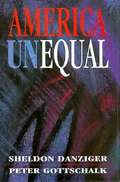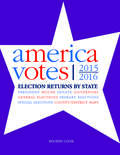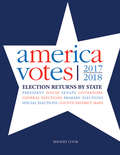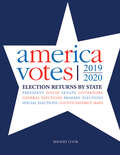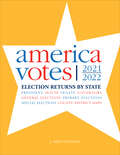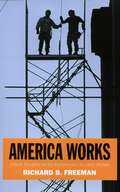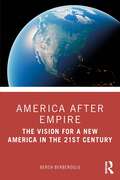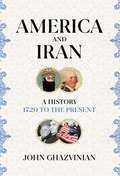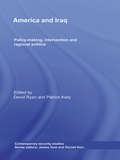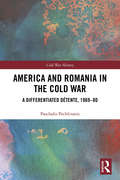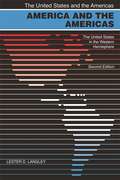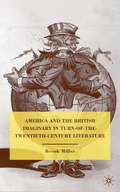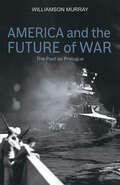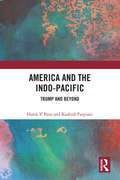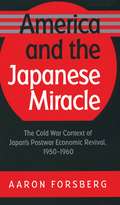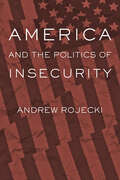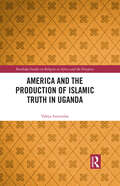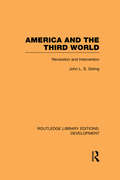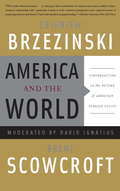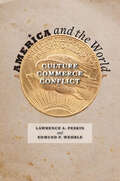- Table View
- List View
America Unequal
by Sheldon Danziger; Peter GottschalkAmerica Unequal challenges the view, emphasized in the Republicans' "Contract with America," that restraining government social spending and cutting welfare should be our top domestic priorities. Instead, it proposes a set of policies that would reduce poverty by supplementing the earnings of low-wage workers and increasing the employment prospects of the jobless. Such demand-side policies, are essential for correcting a labor market that has been increasingly unable to absorb less-skilled and less-experienced workers.
America Votes 32: 2015-2016, Election Returns by State
by Rhodes CookAuthoritative, extensive in scope and meticulously researched, America Votes is a valuable resource that includes official, state-certified election returns for the presidential, House, Senate, and gubernatorial elections of 2015 and 2016. Including both primary and general election data, this volume is an essential acquisition for university, school, public, and professional libraries. <p><p> First published during the Eisenhower administration researchers have long depended on America Votes for its consistent and detailed presentation of election data from across disparate state election offices. Author Rhodes Cook brings to the volume years of election analysis experience and expertise in navigating the complicated U.S. electoral landscape. Features of the updated 32nd Edition include: <p> An introduction to the 2016 elections, including useful statistics and analysis of the Republican victories that cemented their control of the House and Senate <p> Primary and general election results for the 2016 congressional, gubernatorial and presidential elections <p> Congressional special elections from the 114th and 115th Congresses <p> Historical election returns for presidential, gubernatorial, and Senate races
America Votes 33: 2017-2018, Election Returns by State
by Rhodes CookAuthoritative, extensive in scope and meticulously researched, America Votes is a valuable resource that includes official, state-certified election returns for the presidential, House, Senate, and gubernatorial elections of 2017 and 2018. Including both primary and general election data, this volume is an essential acquisition for university, school, public, and professional libraries. First published during the Eisenhower administration researchers have long depended on America Votes for its consistent and detailed presentation of election data from across disparate state election offices. Author Rhodes Cook brings to the volume years of election analysis experience and expertise in navigating the complicated U.S. electoral landscape. Features of the updated 33rd Edition include: An introduction to the 2018 elections, including useful statistics and analysis of Trump's influence at the voting booth and the countered anticipation of a blue wave Primary and general election results for the 2018 congressional and gubernatorial elections Congressional special elections from the 115th and 116th Congresses Historical election returns for gubernatorial and Senate races
America Votes 33: 2017-2018, Election Returns by State
by Rhodes CookAuthoritative, extensive in scope and meticulously researched, America Votes is a valuable resource that includes official, state-certified election returns for the presidential, House, Senate, and gubernatorial elections of 2017 and 2018. Including both primary and general election data, this volume is an essential acquisition for university, school, public, and professional libraries. First published during the Eisenhower administration researchers have long depended on America Votes for its consistent and detailed presentation of election data from across disparate state election offices. Author Rhodes Cook brings to the volume years of election analysis experience and expertise in navigating the complicated U.S. electoral landscape. Features of the updated 33rd Edition include: An introduction to the 2018 elections, including useful statistics and analysis of Trump's influence at the voting booth and the countered anticipation of a blue wave Primary and general election results for the 2018 congressional and gubernatorial elections Congressional special elections from the 115th and 116th Congresses Historical election returns for gubernatorial and Senate races
America Votes 34: 2019-2020, Election Returns by State
by Rhodes CookFirst published during the Eisenhower administration, researchers have long depended on America Votes for its consistent and detailed presentation of election data from across disparate state election offices. America Votes (AV) is published biennially, and since the mid-1990s has been authored or co-authored by Rhodes Cook, who brings to the volume years of election analysis experience and expertise in navigating the complicated U.S. electoral landscape. The book contains an introduction and election coverage by Cook, which will be expanded this edition to capture new trends analysis, and is predominantly composed of election result tables. Organized by state, this edition of AV is a valuable resource that includes official, state-certified special, primary, and general election returns for the House, Senate, and gubernatorial elections of 2019 and 2020.
America Votes 34: 2019-2020, Election Returns by State
by Rhodes CookFirst published during the Eisenhower administration, researchers have long depended on America Votes for its consistent and detailed presentation of election data from across disparate state election offices. America Votes (AV) is published biennially, and since the mid-1990s has been authored or co-authored by Rhodes Cook, who brings to the volume years of election analysis experience and expertise in navigating the complicated U.S. electoral landscape. The book contains an introduction and election coverage by Cook, which will be expanded this edition to capture new trends analysis, and is predominantly composed of election result tables. Organized by state, this edition of AV is a valuable resource that includes official, state-certified special, primary, and general election returns for the House, Senate, and gubernatorial elections of 2019 and 2020.
America Votes 35: 2021-2022, Election Returns by State
by John Miles ColemanFirst published during the Eisenhower administration, researchers have long depended on America Votes for its consistent and detailed presentation of election data from across disparate state election offices. America Votes (AV) is published biennially, and contains an introduction and election coverage by the author, which captures new trends analysis, and is predominantly composed of election result tables. Organized by state, this edition of AV is a valuable resource that includes official, state-certified special, primary, and general election returns for the House, Senate, and gubernatorial elections of 2021 and 2022.
America Votes 35: 2021-2022, Election Returns by State
by John Miles ColemanFirst published during the Eisenhower administration, researchers have long depended on America Votes for its consistent and detailed presentation of election data from across disparate state election offices. America Votes (AV) is published biennially, and contains an introduction and election coverage by the author, which captures new trends analysis, and is predominantly composed of election result tables. Organized by state, this edition of AV is a valuable resource that includes official, state-certified special, primary, and general election returns for the House, Senate, and gubernatorial elections of 2021 and 2022.
America Works: Thoughts on an Exceptional U.S. Labor Market
by Richard B. FreemanThe U.S. labor market is the most laissez faire of any developed nation, with a weak social safety net and little government regulation compared to Europe or Japan. Some economists point to this hands-off approach as the source of America’s low unemployment and high per-capita income. But the stagnant living standards and rising economic insecurity many Americans now face take some of the luster off the U.S. model. In America Works, noted economist Richard Freeman reveals how U.S. policies have created a labor market remarkable both for its dynamism and its disparities. America Works takes readers on a grand tour of America’s exceptional labor market, comparing the economic institutions and performance of the United States to the economies of Europe and other wealthy countries. The U.S. economy has an impressive track record when it comes to job creation and productivity growth, but it isn’t so good at reducing poverty or raising the wages of the average worker. Despite huge gains in productivity, most Americans are hardly better off than they were a generation ago. The median wage is actually lower now than in the early 1970s, and the poverty rate in 2005 was higher than in 1969. So why have the benefits of productivity growth been distributed so unevenly? One reason is that unions have been steadily declining in membership. In Europe, labor laws extend collective bargaining settlements to non-unionized firms. Because wage agreements in America only apply to firms where workers are unionized, American managers have discouraged unionization drives more aggressively. In addition, globalization and immigration have placed growing competitive pressure on American workers. And boards of directors appointed by CEOs have raised executive pay to astronomical levels. Freeman addresses these problems with a variety of proposals designed to maintain the vigor of the U.S. economy while spreading more of its benefits to working Americans. To maintain America’s global competitive edge, Freeman calls for increased R&D spending and financial incentives for students pursuing graduate studies in science and engineering. To improve corporate governance, he advocates licensing individuals who serve on corporate boards. Freeman also makes the case for fostering worker associations outside of the confines of traditional unions and for establishing a federal agency to promote profit-sharing and employee ownership. Assessing the performance of the U.S. job market in light of other developed countries’ recent history highlights the strengths and weaknesses of the free market model. Written with authoritative knowledge and incisive wit, America Works provides a compelling plan for how we can make markets work better for all Americans. A Volume in the Russell Sage Foundation's Centennial Series
America after Empire: The Vision for a New America in the 21st Century
by Berch BerberogluAfter the end of America’s longest (20-year) war in Afghanistan and Iraq that cost more than $6 trillion and nearly half a million lives, what does the future hold for America and the American people in the 21st century? In this timely and important book, Berch Berberoglu provides an eye-opening account of the history of the American Empire from its inception to the present, with prospects for its future. Examining the worldwide expansion of the American Empire over the course of its turbulent history in great detail, Berberoglu assesses America’s imperial legacy in a sober way, highlighting its failure to come to terms with the enormous cost of this adventure in imperial overreach. But Berberoglu sees light at the end of the long, dark tunnel, when the American people will awaken and lead the way to a new America after empire in the coming decades of the 21st century.
America and Iran: A History, 1720 to the Present
by John GhazvinianIn recent times, the United States and Iran have seemed closer to war than peace, but that is not where their story began. When America was in its infancy, Thomas Jefferson and John Quincy Adams turned to the history of the Persian Empire as they looked for guidance on how to run their new country. And in the following century, Iranian newspapers heralded America as an ideal that their own government might someday emulate. How, then, did the two nations become the adversaries that they are today? In this rich, fascinating history, John Ghazvinian traces the complex story of America and Iran over three centuries. Drawing on years of research conducted in both countries – including access to Iranian government archives rarely available to Western scholars – he leads us through the four seasons of US-Iranian relations: from the spring of mutual fascination, where Iran, sick of duplicitous Britain and Russia interfering in its affairs, sought a relationship with the United States, to the long, dark winter of hatred that we are yet to see end. A revealing account, America and Iran lays bare when, where and how it all went wrong – and why it didn&’t have to be this way.
America and Iraq: Policy-making, Intervention and Regional Politics (Contemporary Security Studies)
by David Ryan Patrick KielyThis edited volume provides an overview on US involvement in Iraq from the 1958 Iraqi coup to the present-day, offering a deeper context to the current conflict. Using a range of innovative methods to interrogate US foreign policy, ideology and culture, the book provides a broad set of reflections on past, present and future implications of US-Iraqi relations, and especially the strategic implications for US policy-making. In doing so, it examines several key aspects of relationship such as: the 1958 Iraqi Revolution; the impact of the 1967 Arab-Israeli War; the impact of the Nixon Doctrine on the regional balance of power; US attempts at rapprochement during the 1980s; the 1990-91 Gulf War; and, finally, sanctions and inspections. Analysis of the contemporary Iraq crisis sets US plans against the ‘reality’ they faced in the country, and explores both attempts to bring security to Iraq, and the implications of failure.
America and Romania in the Cold War: A Differentiated Détente, 1969-80 (Cold War History)
by Paschalis PechlivanisThis book examines the US foreign policy of differentiation towards the socialist regimes of Eastern Europe as it was implemented by various administrations towards Ceausescu’s Romania from 1969 to 1980. Drawing from multi-archival research from both US and Romanian sources, this is the first comprehensive analysis of differentiation and shows that Washington’s Eastern European policy in the 1970s was more nuanced than the common East vs. West narrative suggests. By examining systemic Cold War factors such as the rise of détente between the two superpowers and the role of agency, the study deals with the dynamics that shaped the evolution of American-Romanian relations after Bucharest’s opening towards the West, and the subsequent embrace of this initiative by Washington as an instrument to undermine the unity of the Soviet bloc. Furthermore, it revises interpretations about Carter’s celebrated human rights policy based on the Romanian case, pointing towards a remarkable continuity between the three administrations under examination (Nixon, Ford and Carter). By doing so, this study contributes to the field by highlighting a largely neglected aspect of US foreign policy and uncovers the subtleties of Washington’s relations with one of the most vigorous actors of the Eastern European bloc. This book will be of much interest to students of Cold War Studies, US foreign policy, Eastern European politics and International Relations in general.
America and the Americas: The United States in the Western Hemisphere (2nd edition)
by Lester D. LangleyIn this completely revised and updated edition of America and the Americas, Lester D. Langley covers the long period from the colonial era into the twenty-first century, providing an interpretive introduction to the history of U. S. relations with Latin America, the Caribbean, and Canada. Langley draws on the other books in the series to provide a more richly detailed and informed account of the role and place of the United States in the hemisphere. In the process, he explains how the United States, in appropriating the values and symbolism identified with "America," has attained a special place in the minds and estimation of other hemispheric peoples. Discussing the formal structures and diplomatic postures underlying U. S. policy making, Langley examines the political, economic, and cultural currents that often have frustrated inter-American progress and accord.
America and the British Imaginary in Turn-of-the-Twentieth-Century Literature
by Brook MillerIn an innovative reading of fin-de-siecle cultural texts, Miller argues that British representations of America, Americans, and Anglo-American relations at the turn of the twentieth century provided an important forum for cultural distinction.
America and the Future of War: The Past as Prologue
by Williamson MurrayThroughout the world today there are obvious trouble spots that have the potential to explode into serious conflicts at any time in the immediate or distant future. This study examines what history suggests about the future possibilities and characteristics of war and the place that thinking about conflict deserves in the formation of American strategy in coming decades. The author offers a historical perspective to show that armed conflict between organized political groups has been mankind's constant companion and that America must remain prepared to use its military power to deal with an unstable, uncertain, and fractious world.Williamson Murray shows that while there are aspects of human conflict that will not change no matter what advances in technology or computing power may occur, the character of war appears to be changing at an increasingly rapid pace with scientific advances providing new and more complex weapons, means of production, communications, and sensors, and myriad other inventions, all capable of altering the character of the battle space in unexpected fashions. He explains why the past is crucial to understanding many of the possibilities that lie in wait, as well as for any examination of the course of American strategy and military performance in the future—and warns that the moral and human results of the failure of American politicians and military leaders to recognize the implications of the past are already apparent.
America and the Indo-Pacific: Trump and Beyond
by Harsh Pant Kashish ParpianiThis book offers an extensive account of Donald Trump’s foreign policy record in the Indo-Pacific region. Set against the backdrop of Trump’s policy of sustained US confrontation with China, it recounts his administration’s efforts to shore up America’s position with the Indo-Pacific strategy. It also reviews Trump’s record with allies and partners in the Indo-Pacific and the South Asian subregion in context of the ‘great power competition’ between China and the United States. Amidst the ongoing conversations on the declining currency of American internationalism, the volume showcases the seeming insularity of the Indo-Pacific region from forces that are informing an America in retreat. In noting Trump’s record to have been a consequential one, the authors also offer insights into the prospects for US policy continuity under Joe Biden. This timely book will be of great interest to scholars, teachers and students of politics and international relations, Asia studies, US-China studies, area studies, foreign policy, maritime studies, and world politics. It is a recommended read for all watchers of US foreign policy and the evolving US-China rivalry.
America and the Japanese Miracle
by Aaron ForsbergIn this book, Aaron Forsberg presents an arresting account of Japan's postwar economic resurgence in a world polarized by the Cold War. His fresh interpretation highlights the many connections between Japan's economic revival and changes that occurred in the wider world during the 1950s. Drawing on a wealth of recently released American, British, and Japanese archival records, Forsberg demonstrates that American Cold War strategy and the U.S. commitment to liberal trade played a central role in promoting Japanese economic welfare and in forging the economic relationship between Japan and the United States. The price of economic opportunity and interdependence, however, was a strong undercurrent of mutual frustration, as patterns of conflict and compromise over trade, investment, and relations with China continued to characterize the postwar U.S.-Japanese relationship.Forsberg's emphasis on the dynamic interaction of Cold War strategy, the business environment, and Japanese development challenges "revisionist" interpretations of Japan's success. In exploring the complex origins of the U.S.-led international economy that has outlasted the Cold War, Forsberg refutes the claim that the U.S. government sacrificed American commercial interests in favor of its military partnership with Japan.
America and the Japanese Miracle: The Cold War Context of Japan's Postwar Economic Revival, 1950-1960
by Aaron ForsbergIn this book, Aaron Forsberg presents an arresting account of Japan's postwar economic resurgence in a world polarized by the Cold War. His fresh interpretation highlights the many connections between Japan's economic revival and changes that occurred in the wider world during the 1950s. Drawing on a wealth of recently released American, British, and Japanese archival records, Forsberg demonstrates that American Cold War strategy and the U.S. commitment to liberal trade played a central role in promoting Japanese economic welfare and in forging the economic relationship between Japan and the United States. The price of economic opportunity and interdependence, however, was a strong undercurrent of mutual frustration, as patterns of conflict and compromise over trade, investment, and relations with China continued to characterize the postwar U.S.-Japanese relationship.Forsberg's emphasis on the dynamic interaction of Cold War strategy, the business environment, and Japanese development challenges "revisionist" interpretations of Japan's success. In exploring the complex origins of the U.S.-led international economy that has outlasted the Cold War, Forsberg refutes the claim that the U.S. government sacrificed American commercial interests in favor of its military partnership with Japan.
America and the Politics of Insecurity (Themes in Global Social Change)
by Andrew RojeckiAn innovative analysis of polarized politics post-9/11.In America and the Politics of Insecurity, Andrew Rojecki assesses the response of citizens and politicians to a series of crises that confronted the United States during the first decade of the twenty-first century. This period brought Americans face to face with extraordinarily difficult problems that were compounded by their origin in seemingly uncontrollable global forces. Rojecki establishes a theoretical framework for understanding how these new uncertainties contribute to increasingly polarized political discourse. Analyzing three domains of American insecurity—economic, environmental, and existential—Rojecki examines responses to the Great Recession by groups like the Tea Party and Occupy Wall Street; considers why the growing demand for fossil fuels makes people disregard global warming; and explores the desire for security measures that restrict personal freedom in the age of terrorism. Ultimately, he explains why the right has thus far held an edge over the left in the politics of insecurity.Rojecki concludes that in order to address these broad-scale political problems, we must reframe domestic issues as reactions to undiagnosed global conditions. Bringing the psychology of uncertainty together with contemporary case studies, this book is a sweeping diagnostic for—and antidote to—ineffective political discourse in a globalized world that imports bads as well as goods.
America and the Production of Islamic Truth in Uganda (Routledge Studies on Religion in Africa and the Diaspora)
by Yahya SserembaThis book investigates the ways in which the war on terror has transformed the postcolonial state in Africa. Taking American intervention in Islamic education in Uganda as the entry point, the book demonstrates how state control over Islamic truth production and everyday Muslim life has increased. During the colonial period, the Muslims in Uganda were governed in two ways: partly as lesser citizens within the Christian-dominated civil sphere and partly as members of a distinct Muslim domain. In this domain, a local system of Islamic education developed with a degree of autonomy that reflected the limits of the colonial state in shaping the Muslim subject. In the subsequent postcolonial period, systems of patronage and clientalistic networks dominated, and Muslim leaders were co-opted by the state, but without much real interference in the day-to-day lives of ordinary Muslims. However, as part of the war on terror, the US State Department seeks to bring the mechanisms of Islamic truth production, especially the madrasa, under direct state control and civil society scrutiny. This book argues that the "Muslim domain as a separate entity is coming to an end as it is being absorbed into the civil sphere, unifying the state’s domination of society." The book also analyzes local Ugandan Muslim initiatives to modernise and contextualize their own education and religion and how these initiatives are shaped by and transcend the dominant power. A thorough exploration of US foreign policy and Islamic education, this book will be of interest to students and scholars in the fields of Political Studies, African Studies and Religious Studies.
America and the Third World: Revolution and Intervention (Routledge Library Editions: Development)
by John GirlingJohn Girling’s book, first published in 1980, investigates the relationship between America and the Third World, centring on three main themes: the nature of American involvement in the Third World, the challenge posed by the rival Super-Power; and the Changes both in US-Soviet relations (from containment to détente) and in the Third World. Three propositions are put forward: that the overriding interest of American foreign policy maker is in the stability of the global system of relationships; that this interest coincides with most Third World élites; and that the global system normally operates peacefully, although continually subject to internal and external challenges.
America and the World: Conversations on the Future of American Foreign Policy
by Zbigniew BrzezinskiAmerica’s status as a world power remains at a historic turning point. The strategies employed to win the wars of the twentieth century are no longer working, and the US must contend with the changing nature of power in a globalized world. In America and the World, two of the most respected figures in American foreign policy, Zbigniew Brzezinski and Brent Scowcroft, dissect the challenges facing the US today: the Middle East, Russia, and China, among others. In spontaneous conversations the two authors explore their agreements and disagreements. Defining the center of responsible opinion on American foreign policy, America and the World is an essential primer on a host of urgent issues at a time when our leaders’ decisions could determine how long our nation remains a superpower.
America and the World: Culture, Commerce, Conflict
by Lawrence A. Peskin Edmund F WehrleThis American history explores the country’s role as a globalizing force from the arrival of Columbus to the 21st century.The twenty-first century may be the age of globalization, but America has been at the cutting edge of globalization since Columbus landed here five centuries ago. In America and the World, Lawrence A. Peskin and Edmund F. Wehrle explore America's evolving connections with Europe, Africa, and Asia in the three areas that historically have been indicators of global interaction: trade and industry, diplomacy and war, and the "soft" power of ideas and culture. Divided into four historical phases of globalization, this book considers how international events and trends influenced American as well as how America exerted its own influence—whether economic, cultural, or military—on the world. The authors demonstrate how technology and disease enabled Europeans to subjugate the New World, how colonial American products transformed Europe and Africa, and how post-revolutionary American ideas helped foment revolutions in Europe and elsewhere. Peskin and Wehrle also explore America’s rise to global superpower, and how this power alienated people around the world and bred dissent at home. During the civil rights movement, America borrowed much from the world as it addressed the social issues of the day. At the same time, Americans—especially African Americans—offered a global model for change as the country grappled with racial and gender inequality.
America and the World: Culture, Commerce, Conflict
by Edmund F. Wehrle Lawrence A. PeskinAlthough the twenty-first century may well be the age of globalization, this book demonstrates that America has actually been at the cutting edge of globalization since Columbus landed here five centuries ago.Lawrence A. Peskin and Edmund F. Wehrle explore America's evolving connections with Europe, Africa, and Asia in the three areas that historically have been indicators of global interaction: trade and industry, diplomacy and war, and the "soft" power of ideas and culture. Framed in four chronological eras that mark phases in the long history of globalization, this book considers the impact of international events and trends on the American story as well as the influence America has exerted on world developments. Peskin and Wehrle discuss how the nature of this influence—whether economic, cultural, or military—fluctuated in each period. They demonstrate how technology and disease enabled Europeans to subjugate the New World, how colonial American products transformed Europe and Africa, and how post-revolutionary American ideas helped foment revolutions in Europe and elsewhere. Next, the authors explore the American rise to global economic and military superpower—and how the accumulated might of the United States alienated many people around the world and bred dissent at home. During the civil rights movement, America borrowed much from the world as it sought to address the crippling "social questions" of the day at the same time that Americans—especially African Americans—offered a global model for change as the country strove to address social, racial, and gender inequality. Lively and accessible, America and the World draws on the most recent scholarship to provide a historical introduction to one of today's vital and misunderstood issues.
